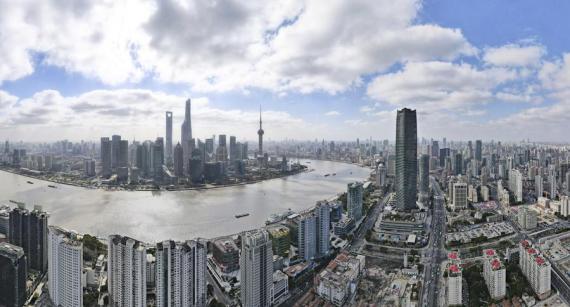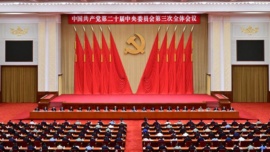The annual Lujiazui Forum, themed “promoting world economic growth with high-quality financial development,” runs from Wednesday to Thursday in Shanghai.
On Wednesday, government officials delivered speeches at the forum, pledging to advance China’s high-standard financial opening-up and improve the financial sector’s support for the real economy, especially new quality productive forces.
Following are the key points of their speeches:
— Deepening reform of STAR market
China will roll out eight new measures to deepen the reform of its Nasdaq-style Science and Technology Innovation Board (STAR) market, according to China Securities Regulatory Commission Chairman Wu Qing.
The measures include giving priority to the listing of enterprises making breakthroughs in new industries, new business patterns and new technologies.
“Only by creating a favorable atmosphere that encourages innovation and tolerates failure can we promote the development of new quality productive forces,” Wu said.
Efforts will also be made to reform the pricing mechanisms for initial public offerings, improve the financing of listed companies on the STAR board, optimize the trading mechanisms, strengthen monitoring, forestall market risks, as well as encourage merger, acquisition and restructuring, Wu said.
— Keeping monetary policy accommodative
China will continue to keep its monetary policy accommodative as well as strengthen counter-cyclical and inter-temporal adjustments, said Pan Gongsheng, governor of the People’s Bank of China (PBOC).
The move will help facilitate economic recovery and create a favorable monetary and financial environment for economic and social development.
Pan said the PBOC has adopted a variety of monetary policy instruments, such as cutting the required reserve ratio and policy rates, and bringing down market rates such as the loan prime rates, which created a favorable monetary and financial environment for the high-quality development of the economy.
— Facilitating foreign investors investing in domestic securities
China will simplify and improve fund management for the dollar-denominated Qualified Foreign Institutional Investor scheme (QFII) and its yuan-denominated sibling, RQFII, said Zhu Hexin, deputy governor of the PBOC.
The QFII and RQFII programs are designed to allow overseas investors to invest in China’s domestic capital market.
“We are revising relevant fund management regulations,” said Zhu, who is also head of the State Administration of Foreign Exchange.
He added that China will also support domestic institutions in making cross-border investments.
— Promoting insurance sector’s development
Accelerating the development of the insurance industry will help improve China’s financial market structure, optimize the allocation of financial resources, and enhance the stability of the financial system, said Li Yunze, head of the National Financial Regulatory Administration.
Li implied the sector’s growth potentials, saying that China’s insurance industry assets only accounted for 7 percent of the country’s total financial industry assets, while the international average was around 20 percent.
“As people’s demands for elderly and medical care as well as the need to support others in society are constantly increasing, demand for diversified insurance protection is also rapidly rising,” he said.
With a view to boosting the development of new quality productive forces, Li said the insurance sector should beef up support for strategic emerging industries, advanced manufacturing, new infrastructure and venture capital.
Noting that opening up is an important driving force for the reform and development of China’s financial industry, Li said that China sincerely welcomes more foreign institutions and long-term capital to come to China for businesses.





















